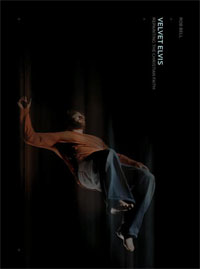Book Notes
 Rob Bell, Velvet Elvis; Repainting the Christian Faith (Grand Rapids: Zondervan, 2005), 194pp.
Rob Bell, Velvet Elvis; Repainting the Christian Faith (Grand Rapids: Zondervan, 2005), 194pp.
I first heard of Rob Bell at a pastor's conference, where his publisher advised me that Velvet Elvis had sold 100,000 copies in less than a year. He also said that 30,000 people a week downloaded his sermons from the Mars Hill church in Grand Rapids, Michigan, that he founded in February of 1999 at the age of twenty-eight. As Bell tells the story in this book, six months after Mars Hill opened their doors, 4,000 people attended; in two years the number grew to 10,000 people at their three Sunday services (they bought a mall to accommodate the crowds). So, I was not surprised when my son in college told me not long ago that he and his buddies were listening to downloaded sermons by "some guy named Rob Bell," or that this past weekend the New York Times ran a positive article about him (July 8, 2006, see http://www.nytimes.com/2006/07/08/us/08minister.html?_r=1&oref=slogin).
This from a remarkably candid voice that insists that "the thought of the word church and the word marketing in the same sentence makes me sick." Bell says that he has never read a book on church growth or attended a seminar on church planting. Mars Hill started with "no advertisements, no flyers, no promotions, and no signs." In the NY Times article he bristled at comparisons between him and Billy Graham: "I would be suspect of any pastor who had a clever response to that question." But he's clearly a gifted person with passion and dreams to compliment his candor. Velvet Elvis is his effort to ask afresh "the difficult question of what it means to be a Christian here and now, in this place, at this time." Bell "affirms the historic Christian faith," yet seeks a "new understanding" of what that means. Velvet Elvis is thus delightfully free of religious jargon and cliches that obscure more than they enlighten.
Bell wants Christians to move away from their defensive posture, to acknowledge, for example, that thinking people have honest questions about life and the Gospel, or to admit that "the Bible is a difficult book." Their Mars Hill church had a Doubt Night, and in Velvet Elvis you learn the sorts of questions that people have when you honestly encourage them to express them. Bell, then, is more intent to celebrate the mystery of the Gospel than to conquer or explain it. In this sense Bell and his book does an admirable job of recovering the complexity of a simplistic Gospel that is often gilded with cliches. But, paradoxically, I also think the visceral appeal of his message is that he makes a complex Gospel simple. You will not find weighty theological insights or subtle distinctions in Velvet Elvis, learn much about New Testament scholarship that tackles the Bible as a difficult book (although he quotes the likes of Marcus Borg and NT Wright), or feast on the wisdom of the patristic mothers and fathers. Rather, he presents a simple Gospel in casual prose, avoids controversial issues (eg, homosexuality), and makes liberal use of personal anecdotes.
When the Left Behind series sells 60 million books, and Rick Warren's Purpose-Driven Life some 20 million, it makes you question the relationship between marketing forces that manipulate mammon, a genuine movement of God, and a deep longing in the hearts of people who are so easily satisfied with junk food theology. Bell says that 1,000 people showed up their very first Sunday back in 1999. Even though I appreciated Velvet Elvis, I wonder what, if anything, it has to say to the average believer in the everyday church. You read a lot today about large, wealthy "mega-churches" with famous pastors. These monster churches offer some advantages (I attend one), but of the roughly 400,000 congregations in America, a full half have fewer than 75 regular attenders. In isolated, rural areas the average size of a church is about 50, and in urban settings about 100. What might Rob Bell say to these parishioners and their pastors?


